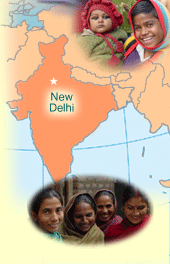
PRIME II’s wide-ranging efforts to improve primary-level family planning and reproductive health (FP/RH) services in Uttar Pradesh, India’s most populous state, included projects aimed at midwives, traditional birth attendants, indigenous practitioners, pregnant women and their families, and community volunteers.
Auxiliary Nurse-Midwives and Lady Health Visitors
Beginning in 1997, PRIME and PRIME II assisted Uttar Pradesh’s State Innovations in Family Planning Services Agency (SIFPSA) in a program that trained more than 10,500 Auxiliary Nurse-Midwives (ANMs) and their supervisors, Lady Health Visitors (LHVs), to improve family planning services in 33 districts. Training emphasized clinic-based FP services, especially IUD insertions and removals, identification of sexually transmitted infections and reproductive tract infections, method-specific FP counseling, HIV/AIDS prevention counseling, and infection prevention. LHVs also received training in supportive supervision.
Key Results: ANMs/LHVs achieved high levels of performance to standard—88% of 9,550 assessed at first follow-up and 92% of 6,728 assessed at second follow-up. Mean observation scores in FP counseling and IUD insertion skills rose from 30% at baseline (n=7,009) to 85% at follow-up (n=5,632).
Community Midwives
Beginning in 2002, PRIME II helped SIFPSA implement a pilot program in four districts of Uttar Pradesh to train Community Midwives (CMWs), a new cadre of private-sector primary providers. The CMWs are intended to supplement the work of public-sector providers (ANMs) and increase access to safe delivery, quality family planning and other reproductive and child health services. PRIME II developed a gender sensitive, skill-based 18-month pre-service curriculum for the CMWs, and a training package for master, lead and CMW trainers. PRIME used the Performance Learning Methodology to revise the postpartum care chapter of the curriculum and test the effectiveness of the methodology with CMW trainees.
Key Results: As of July 2004, 90% of the 239 trainees who entered the program were still enrolled, having passed two semester exams, and were scheduled to complete their final exam and graduate in August. Performance scores for trainers improved from 41% at baseline to 84% for master trainers (n=9), 19% to 69% for lead trainers (n=42, n=51) and 22% to 85% for CMW trainers (n=18).
Indigenous Systems of Medicine Practitioners
PRIME II also helped SIFPSA and the USAID bilateral Innovations in Family Planning Services project to develop the capabilities of Indigenous Systems of Medicine practitioners (ISMPs) in non-clinical family planning counseling and services. These providers, who practice a blend of traditional and modern medicine, are responsible for most of the curative health services in Uttar Pradesh. Initially, PRIME collaborated with two local NGOs in a pilot project in two districts to formulate a strategy and training package that drew on the Performance Improvement (PI) approach to equip ISMPs to counsel clients for family planning, distribute condoms and pills, and refer clients needing clinical FP services. The program was scaled-up to 15 districts, training 12,162 ISMPs. Using findings from a performance needs assessment, PRIME II assisted SIFPSA to revise its strategy for ISMPs to focus more on promotion of providers, client education, contraceptive social marketing and other supportive activities. As part of this process, a PRIME study examined sales of commercial contraceptives as motivation for ISMPs to offer FP counseling.
Key Results: Of the 12,162 trained ISMPs, 81% were performing to standard when assessed post-training in general FP counseling and method-specific counseling for oral contraceptive pills and condoms.
Traditional Birth Attendants
With funding from USAID/India, PRIME II provided technical assistance to the Prerana Population Resource Center (PPRC) to enhance its capacity to plan, conduct, monitor and evaluate performance-based training for traditional birth attendants (TBAs). PPRC’s goal was to strengthen the ability of TBAs to provide clean delivery and family planning counseling and services in their communities and to improve referrals for obstetric complications. More than 13,500 TBAs in 17 districts have been trained through the program. After revisions that drew upon lessons learned in Uttar Pradesh, PRIME introduced the performance-based curriculum to TBA trainers in Uttaranchal state.
Key Results: Of 6,948 TBAs receiving follow-up assessments, 81% were performing to standard.
Community Partnerships for Safe Motherhood
Completed in early 2003, the Community Partnerships for Safe Motherhood (CPSM) project showed that when pregnant women and their family caregivers understand the birth process and can recognize and manage life-threatening complications when they arise, their knowledge and skills will help reduce risky behaviors. The project also worked to increase postpartum and postabortion family planning, develop referral systems with emergency transportation and funds, and establish sustainable networks of community volunteers. Home-Based Life-Saving Skills (HBLSS) modular materials used in CPSM workshops focused on hemorrhage and sepsis and also included prenatal care, safe delivery, postpartum care and family planning. Visual aids (“Take Action Cards”) facilitated the recall of HBLSS messages among trainers, home-based birth attendants and recent mothers, and proved to be essential tools for promoting the longer-term impact of CPSM. Hand-in-hand with this information, women are supported by a significant, sustainable village network of volunteers who guide the entire process and solve problems on the most local level. PRIME II worked with Shramik Bharti, the implementing NGO, to carry out CPSM in 11 villages and 29 hamlets of Uttar Pradesh.
Key Results: A final evaluation of the CPSM program demonstrated that healthier practices had indeed been encouraged. Women who had completed the HBLSS series were significantly more likely to put their newborn infant to the breast within one hour of birth (76% as opposed to 2% at baseline, n=563, n=520)—a break from centuries of local tradition. The women were also more likely to accept tetanus toxoid injections (86% vs. 37%, n=668, n=542) and accept a modern family planning method in the immediate postpartum period (61% vs. 13.5%, n=545, n=533). In addition, data showed that in 75% of deliveries (n=646), pregnant women and their families had saved money, made transportation arrangements and were aware of the nearest referral site in the event of complications; only 15% of pregnant women and their families (n=600) had made such preparations at baseline.
|











